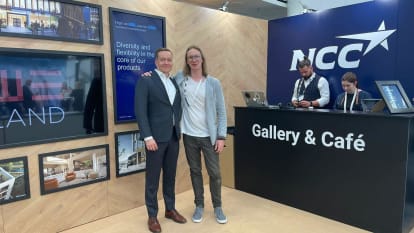Business Arena gathers real estate industry together in Helsinki
Business Arena is a leading Nordic real estate event held in Helsinki 24 May 2022. NCC had an exhibition stand at the event and participated in the seminar presentations.
Focusing on the Finnish real estate market and investment opportunities, Business Arena Helsinki gathered the real estate investors and professionals, politicians and local authorities to Messukeskus Helsinki after the long silence due to the COVID-19 pandemic. NCC had an exhibition stand which was styled as a lounge to convey a clear message: the office must have a special draw in order for the employees to prefer working at the office instead of the home!
– The biggest problem our office clients are facing is, how to attract the employees back to the office after the remote working period. This could be solved concretely by offering spaces that support the increasing on-line meetings and by encouraging people to come together – also informally – in big and welcoming meeting rooms – certainly also by ensuring the distances, although this is not as topical in Finland than elsewhere, Teemu Rämö, Head of Department of NCC Property Development says.
Discussions on crisis resilience of cities and current office trends
NCC’s Teemu Rämö also participated in two seminars “War, Climate and Pandemics – How do We Define a Resilient City” and “Trends: The Office of The Future – How do we make the crowded space feel uncrowded?”
– We hope that the city planning always allowed for flexibility depending on the quickly changing demands of the world. The locations of office spaces are currently polarised, meaning that the trend that was seen already before the pandemic has strengthened. In the metropolitan area there are only a few established workplace areas, and the construction of new office spaces seems to be focused in those areas due to the client demand. This is not always welcomed by the cities, but this is how the market works now.
Rämö is happy that events like Business Arena can again be arranged.
– For two years we have not been able to gather, but now there seemed to be lots of Finnish property investors and some international investors present as well. NCC’s office projects often end up in the ownership of international property investors.
Sustainability solutions with emission reduction as a priority
Also in real estate, the number one theme of our times, expressed in various terms and viewpoints, are responsibility, sustainability and, applicable especially in property investments, ESG (Environmental, Social and Governance). NCC’s Urban Development Hippie Eelis Rytkönen carried the message of ESG matters to the Business Arena:
– As we see it, the most critical and urgent task of the three ESG themes is the environment and the necessity to cut emissions, but our projects are also targeted at considering social and administrative aspects. NCC’s environmental viewpoint boils down to the calculation of the carbon footprint and controlling the emissions along with the costs throughout the project. We target for energy class A, a 50% material emission reduction between 2020 and 2030, our Sustainable Site concept, the BREEAM Excellent environmental certificate and compliance with the EU taxonomy. We aim to develop low-carbon, sustainable spaces that provide an inviting setting for the people to solve important tasks.
According to Rytkönen, environmental matters have long been mostly viewed through maximising the property’s energy efficiency and optimising energy consumption during operation, whereas now, owing to the development of the energy systems, he now sees a quick shift towards minimising the emissions related to the materials used.
– For the materials, NCC aims to halve the emissions by 2030 from the level of 2020 by optimising the material quantities and requiring low-carbon, recyclable materials from the material suppliers, Eelis Rytkönen states.
Increasing the efficiency of space use raised in the sustainability discussions
Buildings are responsible for one third of global emissions, and by UN estimates the global building stock will double between 2020 and 2060. The occupancy rate of office spaces is generally low. That is why Development-hippie Eelis Rytkönen foresees the future in sharing part of the spaces and costs. The necessary technologies and cultural readiness already exist owing to the pandemic.
– I think that the next step will be for us to start discussing responsible space use focusing more on the social and governance themes in ESG, even on cultural aspects. Overall sustainability can be achieved by reserving an adequate space for each individual function – not too big and not too small – and by arranging the qualities of the office environment so that they will suit working at the office and home, maybe even in third places, ensuring the well-being of individuals and teams and adding flexibility to the contracts, Eelis Rytkönen concludes.
The event also brought up the dilemma of the obsolete office stock where the development equations do not seem to work financially.
– However, regulation will likely drive us towards upgrading the energy efficiency of existing building stock or conversion of the buildings regardless of their location, so by some equation even they should be brought into operation. In any case vacant premises are a burden both to the environment and the wallet while their real value remains next to none, that’s why I think that moderate rationing of the space use will become a virtue by ESG indicators, Eelis Rytkönen concludes.
